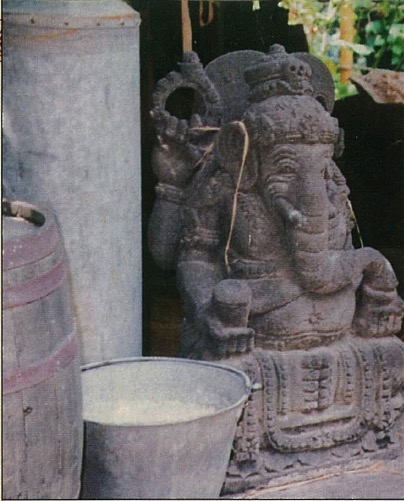Is the Elephant God getting due respect?
By Archana Dongre, Los Angeles
Spun out of the supremely creative imagination of Walt Disney, Mic-key Mouse is the central character of the fabled Disneyland. Although endowed with human-like qualities, he is still a mouse, the vehicle of Lord Ganesha since time immemorial. With this ironic coincidence, one might wonder, does the God of abundance and the abode of all artistic genius lurk somewhere in the sprawling 85-acre amusement park, casting his benevolent grace on the more than half-billion pilgrims of joy that have passed through the turnstiles of Disneyland since its doors opened in 1955? He is indeed there—thrice, in fact—as I discovered during a sweltering summer day’s visit. But not all Hindus have been pleased with His less than dignified circumstances.
I found Him first along the Jungle Cruise ride in the form of a giant, well-designed ten-foot grey stone statue, sitting royally since 1962 against a backdrop of green tropical forest. A few minutes into the ride, our guide erupted enthusiastically, “And now to your left you will see the Hindu deity of …” The ride is replete with rustic, even barbaric themes, like cannibals dancing, a tribal selling human heads, a safari scene and sights of wild animals including hippos and a python.
What is a refined Deity like Ganesha doing in such a place? Most Hindus I spoke with actually liked seeing Him there. It was a touch of their own culture to this masterminded, worldclass Mecca of entertainment. What about non-Hindu Americans? Their response was typically, “Oh, it’s interesting,” but nothing offered for or against it.
More controversial is Ganesha’s appearance in the breath-taking Indiana Jones ride, opened in 1995. The theme of the ride is essentially the story of a Hindu temple uncovered in the jungle by Western archaeologists, who also discover its secret of wealth and its curse. The entrance of the ride is a temple-like structure, not unlike Mahabalipuram, in South India, though old and crumbling. Snaking through the hour-long wait in line, I wound through the outside area where Hindu-looking Deities carved of stone (or cast in concrete) appear to have been removed from the temple and are being packed for shipping. Shipping where? One can conjecture they are enroute to museums or to those art dealers who pirate and sell fine sculptures from Hindu temples for hefty, selfish profits.
Tall towers with Naga faces and the Naga theme are seen everywhere. Exiting the six-minute action ride, with its wild bumping and careening in a jeep-like vehicle, one is confronted with another statue of Lord Ganesha on a cart [photo above]. He is surrounded by ordinary paraphernalia of excavation and crates, treated like a piece of archeological merchandise.
Views differed according to the emotional nature of the onlooker. To some people, the entire theme is the rape of a Hindu temple, as offensive as the original “Indiana Jones and the Temple of Doom” movie upon which the ride is based, which grossly misrepresented the Hindu Goddess Kali, the Hindu culture, even the Hindu cuisine and eating habits.
People I saw coming out of the ride were engrossed in what they saw inside or eager to go on to the next attraction. Most didn’t even notice the third Ganesha statue situated outside. Hindus, however, rarely miss it. The general consensus of those I spoke with was, “It may not be offensive, but the West needs to be educated. Once they know the significance of our Deity, they will be more careful about using it in places like this.” Others, such as Ravi Peruman of California, were incensed at the disrespectful treatment. She-khar Ganapathy and Shobha Na-rayan, a young couple from Mumbai, were distressed by the overall temple piracy theme.
“No comment,” was all John McClintock, senior public relations officer for Disney, offered when questioned about Ganesha. He did say, however, that there are no other religious icons of any faith in the park; even the park’s “Hunchback of Notre Dame” cathedral set is devoid of Christian symbols. Swami Atmarupananda, head of the Vedan-ta Society in San Diego, advised, “Hindus, especially those who are born into the religion, tend to have a let-go attitude in such situations. But if we do not stand up for the sacredness of our Deities, who will? If the connotation of where the Ganesha is situated goes against our beliefs and modes of worship, then we have to tell them about it.
